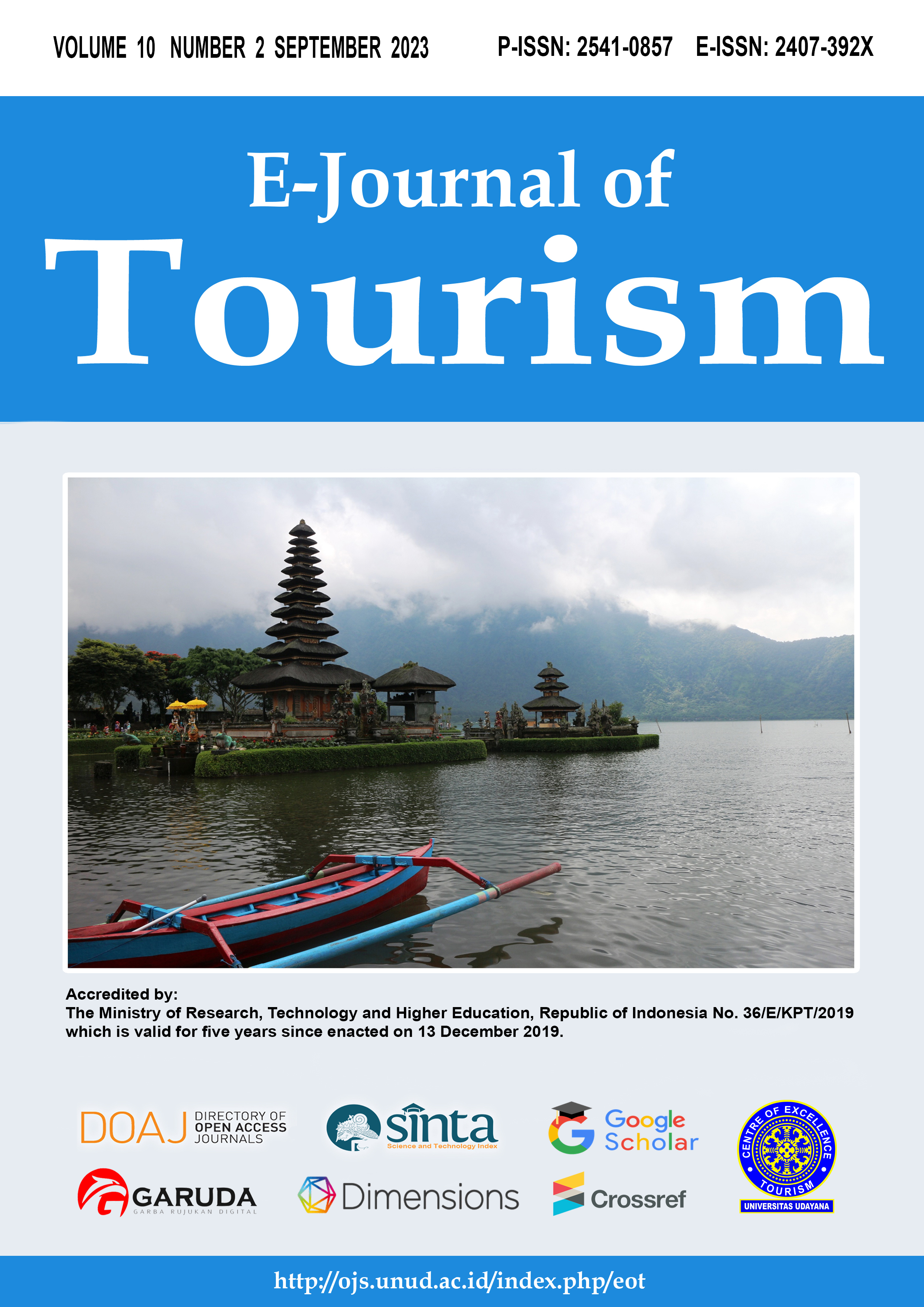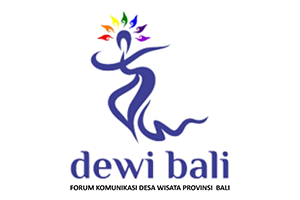Impact Assessment of Pandemic Covid-19 on Four Typologies of Tourism Villages in The Special Region of Yogyakarta
Abstract
The pandemic has caused dramatic changes in the tourism sector globally including tourist villages. This study aims to identify the impact of the Covid-19 pandemic on four typologies of tourist villages in DIY, both positively and negatively. This research is qualitative research. Data was collected through interviews with the head of the tourist village. Content analysis is an analytical technique used in this study. The results of the study show that the COVID-19 pandemic does not always have a detrimental impact but also creates opportunities for tourism village communities to make sustainable progress. The positive impact of Covid-19 on tourist villages can be seen in terms of finance, environment, social cohesion, youth participation, product innovation, management/regulation changes, facilities, networking, and increasing technology use. Even so, Covid-19 still leaves new challenges for tourist villages to face a new era of post-pandemic tourism. These results certainly have implications for the practice of developing tourist villages in DIY in the future.
Downloads
References
Candia, S., & Pirlone, F. (2022). Tourism environmental impacts assessment to guide public authorities towards sustainable choices for the post-COVID era. Sustainability (Switzerland), 14(1). https://doi.org/10.3390/su14010018
Damanik, J., Utami, S., & Mayani, M. (2022). The Dramatic Fall of Tourism Villages Amid the COVID-19 Pandemic: A Reflection on an Indonesia’s Primary Tourism Destination. In Proceedings of the International Academic Conference on Tourism (INTACT) “Post Pandemic Tourism: Trends and Future Directions” (INTACT 2022) (pp. 507–520). Atlantis Press SARL. https://doi.org/10.2991/978-2-494069-73-2_37
Everingham, P., & Chassagne, N. (2020). Post COVID-19 ecological and social reset: moving away from capitalist growth models towards tourism as Buen Vivir. Tourism Geographies, 22(3), 555–566. https://doi.org/10.1080/14616688.2020.1762119
Gowreesunkar, V., Maingi, S. W., Roy, H., & Micera, R. (2022). REBUILDING TOURISM POST PANDEMIC -POLICY RECOMMENDATIONSFROM GLOBAL CASE STUDIES. Emerald Open Research, 1–5. https://doi.org/10.35241/emeraldopenres.1114919.1
Hakim, L. (2020). COVID-19 and the Moment to Evaluate Tourism Euphoria, Indonesia. Journal of Indonesian Tourism and Development Studies, 8(2), 119–123. https://doi.org/10.21776/ub.jitode.2020.008.02.09
Jeon, C. Y., & Yang, H. W. (2021). The structural changes of a local tourism network: comparison of before and after COVID-19. Current Issues in Tourism, 24(23), 3324–3338. https://doi.org/10.1080/13683500.2021.1874890
Kristiana, Y., Pramono, R., & Brian, R. (2021). Adaptation Strategy of Tourism Industry Stakeholders During the COVID-19 Pandemic: A Case Study in Indonesia. Journal of Asian Finance, Economics and Business, 8(4), 0213–0223. https://doi.org/10.13106/jafeb.2021.vol8.no4.0213
Kurniasih, D., Rosyadi, S., Sabiq, A., & Ahmad, A. A. (2022). Collaboration Challenges in Helping the Rural Creative Tourism Sector to Recover During the COVID-19 Pandemic. KnE Social Sciences. https://doi.org/10.18502/kss.v7i9.10954
McCartney, G., Ung, C., & Pinto, J. (2022). Living with COVID-19 and Sustaining a Tourism Recovery—Adopting a Front-Line Collaborative Response between the Tourism Industry and Community Pharmacists. Tourism and Hospitality, 3(1), 47–68. https://doi.org/10.3390/tourhosp3010004
Movono, A., & Scheyvens, R. (2022). Adapting and reacting to Covid-19: Tourism and resilience in the South Pacific. Pacific Dynamics, 6(1), 124–150. https://doi.org/10.26021/12509
NZIER. (2020). Tourism beyond Covid-19 Is the future local and green? https://www.pce.parliament.nz/publications/pristine-popular-
Panzer-Krause, S. (2022). Rural Tourism in and after the COVID-19 Era: “Revenge Travel” or Chance for a Degrowth-Oriented Restart? Cases from Ireland and Germany. Tourism and Hospitality, 3(2), 399–415. https://doi.org/10.3390/tourhosp3020026
Parwata, W., Gede, A. A., Gunawarman, R., Putu, N., Pradnyaswari, R., Putri, A., Deddy, K., Pradsandya, E., & Kurniawan, A. (2022). Post Covid-19 Policy Strategy of Tourism Village as an Effort of Resilience and Sustainability of the Village: A Case Study in Penglipuran Tourism Village, Bali. The International Journal of Social Sciences World TIJOSSW, 4(2), 287–299. https://doi.org/10.5281/zenodo.7421925
Robina-Ramírez, R., Sánchez, M. S. O., Jiménez-Naranjo, H. V., & Castro-Serrano, J. (2022). Tourism governance during the COVID-19 pandemic crisis: A proposal for a sustainable model to restore the tourism industry. Environment, Development and Sustainability, 24(5), 6391–6412. https://doi.org/10.1007/s10668-021-01707-3
Rogerson, J. M., Lekgau, R. J., Mashapa, M. M., & Rogerson, C. M. (2021). Covid-19 and Local Business Responses: Evidence from South Africa’s most Tourism-Dependent Locality. African Journal of Hospitality, Tourism and Leisure, 10(1), 388–405. https://doi.org/10.46222/AJHTL.19770720-107
Sann, R., Lai, P. C., & Chen, C. T. (2023). Crisis Adaptation in a Thai Community-Based Tourism Setting during the COVID-19 Pandemic: A Qualitative Phenomenological Approach. Sustainability (Switzerland), 15(1). https://doi.org/10.3390/su15010340
Seal, M. M., & Premalatha, P. N. (2022). REBOOTING AND RESILIENCE STRATEGY FOR TOURISM SECTOR THROUGH RURAL TOURISM IN COVID-19 PANDEMIC-A CASE STUDY ON ANEGUNDI VILLAGE, KARNATAKA. UGC Care Journal, 43(04), 136–144.
Zhang, L., Zhao, J., Liu, J., & Chen, K. (2020). Community disaster resilience in the covid-19 outbreak: Insights from shanghai’s experience in china. Risk Management and Healthcare Policy, 13, 3259–3270. https://doi.org/10.2147/RMHP.S283447

This work is licensed under a Creative Commons Attribution 4.0 International License.
The copyright of the received article shall be assigned to the journal as the publisher of the journal. The intended copyright includes the right to publish the article in various forms (including reprints). The journal maintains the publishing rights to the published articles.




















